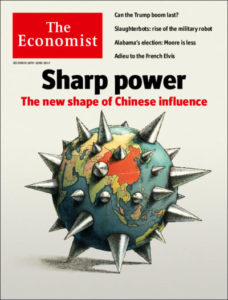
China’s efforts to secure a larger role for itself in multiple international institutions have generated questions about the scale of its ambitions and the ‘sharp power’ tools it will use to advance them, according to a new report. In areas such as democracy promotion, the United States should pursue a more competitive approach to blunting China’s efforts to advance its global ambitions, say analysts Tarun Chhabra, Rush Doshi, Ryan Hass, and Emilie Kimball,
From human rights to energy to trade, China’s growing weight in the international system is bending institutions, rules, and norms in its preferred directions. At the same time, in other areas, such as internationalization of the renminbi and international law, China’s aspirations continue to exceed its impacts, they argue in the Brookings Foreign Policy project “Global China: Assessing China’s Growing Role in the World.”
 Beijing is weakening democratic governance and providing an authoritarian alternative, Patrick W. Quirk, David O. Shullman, and Johanna Kao contend. The United States must pursue a strategy toward China focused on winning the political systems competition. To protect and promote democratic governance, the United States must:
Beijing is weakening democratic governance and providing an authoritarian alternative, Patrick W. Quirk, David O. Shullman, and Johanna Kao contend. The United States must pursue a strategy toward China focused on winning the political systems competition. To protect and promote democratic governance, the United States must:
1) elevate the protection and promotion of democracy as a key consideration in crafting and
executing U.S. foreign policy;
2) use foreign assistance and diplomacy to make countries more resilient to CCP coercion; and
3) champion the superiority of liberal democracy to authoritarianism.
In the Asia-Pacific region, China aims to establish a security architecture that is more
exclusively “Asian,” free of alliances, more attendant to its domestic security concerns, less liberal, and solidly rooted in Chinese economic power, adds analyst Lyndsey W. Ford.
While the United States remains the security partner of choice for many Asia-Pacific countries, China is offering viable alternatives that have popular appeal to authoritarian and illiberal-leaning leaders, which have the potential to reorient regional institutions and standards over time. RTWT
Despite its malleability and limitations, international law can shape the context for the choices of Chinese leaders and the U.S. should reengage in this area, Robert D. Williams argues in a new Brookings paper.
The middle class has tended to value hard work, education, thrift, and determination as pathways to this lifestyle —individualistic attributes that could flourish in a democracy, Homi Kharas and Meagan Dooley add. But how will a growing Chinese middle class impact global politics, when democracy is no longer the only way to achieve a stable middle-class lifestyle?
Global China: Global governance and norms https://t.co/tGXQZFPqzP via @BrookingsInst
— Democracy Digest (@demdigest) October 12, 2020







